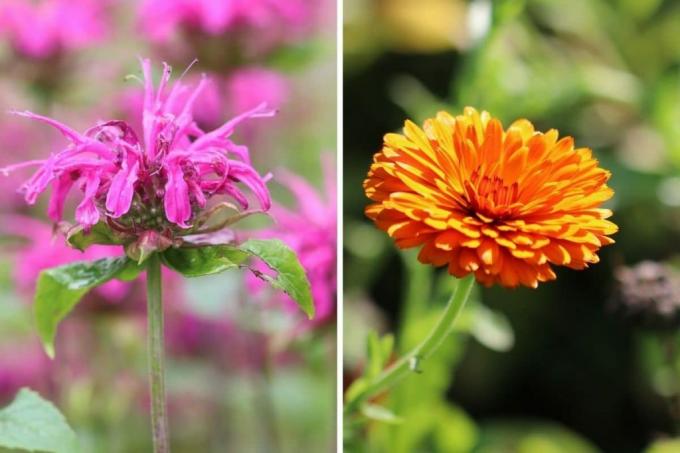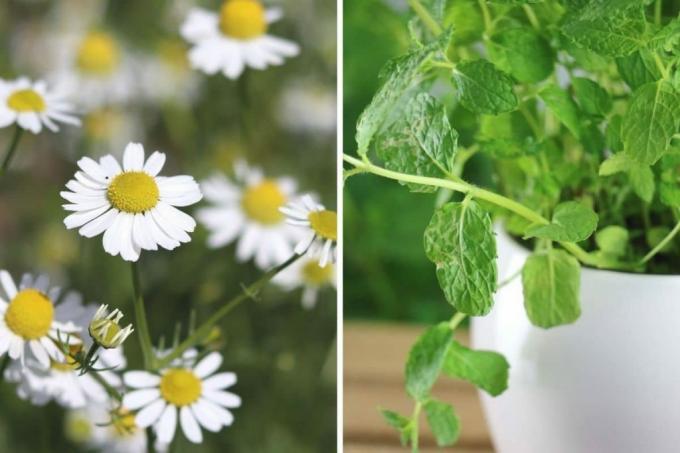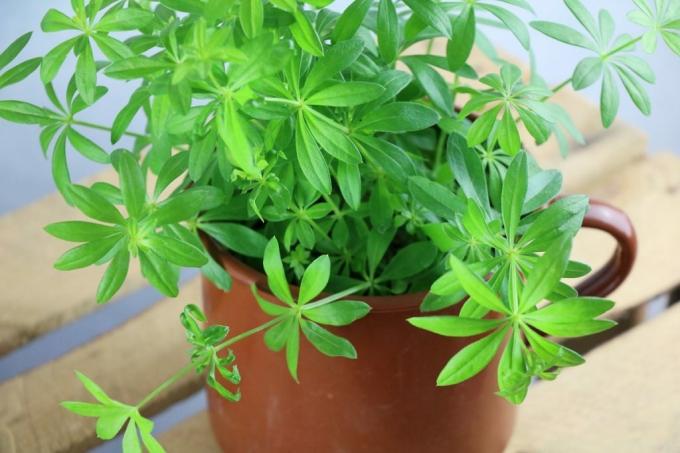
table of contents
- Herbs for tea blends
- Make herbal tea yourself: basic recipe
- Mood enhancer
- Cold tea
- Relaxation tea
- Nettle tea
- Dandelions for weight loss
- Woodruff tea
- frequently asked Questions
Many herbs grow in the home garden, which are not only suitable for refining dishes, but also taste great when brewed as tea and are also healthy. Here you will find 6 herbal tea recipes to make yourself.
In a nutshell
- Many herbs are suitable as a tea, both as a hot drink and as a refreshing iced tea in summer
- Chamomile and mint teas are classics among herbal teas from our own garden
- Herbal tea blends can be invigorating, calming or mood-enhancing
- Always allow herbs to dry before making tea
- different herbs that have the same effect on our body can be mixed well with each other
Herbs for tea blends
There are often so many herbs in your own garden, all of which are wonderfully suitable for making tea. Here you should not only rely on a single kind of herbs, but mixed them according to your mood. The top ten herbs for brewing, either single-flavored or mixed, are here:
| Herbs | properties |
|---|---|
| Damascus rose (Rosa damascena) | calming, relaxing, anti-inflammatory, antipyretic, antispasmodic, analgesic |
| Balm (Monarda didyma) | antioxidant, antiseptic, antiviral (partially), slightly lowering fever, expectorant, improves blood circulation |
| chamomile (Matricaria recutita) | antibacterial, calming, anti-gas, anti-inflammatory, antispasmodic |
| dandelion (Taraxacum sect. Ruderalia) | appetizing, diuretic |
| mint (Mentha sp.) | antiseptic, anti-inflammatory, expectorant, analgesic |
| Marigold (Calendula officinalis) | antibacterial, antiseptic, disinfectant, anti-inflammatory, analgesic, wound healing |
| sage (Salvia officinalis) | antibacterial, anti-gas, anti-inflammatory, antispasmodic, antiperspirant |
| thyme (Thymus vulgaris) | antibacterial, antiviral (partially), appetizing, anti-inflammatory, antipyretic, antispasmodic and expectorant, analgesic, digestive |
| Lemon balm (Melissa officinalis) | Anxiety-relieving, antibacterial, calming, sleep-promoting, inflating, antispasmodic, stress-relieving |
| Lemon verbena (Lippia citriodora) | antibacterial, antipyretic, diuretic, relaxes muscles, relieves pain |
Tip: When putting together the various tea blends, pay attention to the properties that the individual herbs bring with them. Otherwise you can of course brew each herb individually and enjoy it as a tea.
Make herbal tea yourself: basic recipe
There is a simple basic recipe for all tea blends. This applies to both a hot herbal tea and the preparation of refreshing iced tea:

- Let the herbs dry
- Cut off at the base and hang up the bouquet upside down
- in a warm, dry place
- if the leaves crackle when you touch them, drying is successful
- Chop up the dried herbs and fill them into cans or glasses
- Put together the desired mixture
- Pour hot water over the mixture
- let it steep for a few minutes
- Sweeten with honey or agave syrup as desired
- for iced tea let it cool down and then put in the fridge
Tip: The simple infusion should be done because you preserve the medicinal properties of the herbs used as well as the aroma and taste.
Mood enhancer
Especially when the mood is clouded, there are many different types of herbs that can brighten it up again, also by enjoying an herbal tea. Here, the mood-enhancing herbs must be mixed together:

- part of marigold
- two parts of balm
- five parts of lemon verbena
- all mood-enhancing herbs
- a part Rose petals for the taste
- tastes fruity and summery
- one teaspoon of mixture for one cup
- Pour hot water on top
- Let it steep for eight to ten minutes
Cold tea
If you have a cold with a cough, whether in winter or summer, you can make yourself a tasty tea that clears the airways again and thus leads to more well-being:

- a part of balm
- two parts of thyme
- four parts of sage
- five parts of peppermint
- a teaspoon on a cup
- Pour hot water on top
- Brew for six to eight minutes
- sweeten with honey
- is considered antibacterial
- supports the herbal tea in its effect
Note: Thyme and sage in particular are considered to be the herbs that are particularly effective in treating colds. And peppermint tea is also particularly suitable for both a throat disease and an upset stomach.
Relaxation tea
If you have trouble falling asleep in the evening or wake up again and again at night, you can make this recipe for a suitable herbal tea yourself:

- a part Mallow flowers
- two parts of dried apple peel
- three parts of chamomile
- six parts of lemon balm
- two teaspoons for a cup
- Pour hot water
- steep for eight to ten minutes
Tip: If we are talking about hot water with which the tea mixtures are to be infused, then you should never pour the water on with bubbling water, but rather allow it to cool down briefly after boiling. Because the boiling, bubbling water can reduce the effect of the tea.
Nettle tea
Often not in your own garden, but there are nettles along the way. This weed is a real vitamin donor and can therefore also be brewed as a tea. Nettles lose their burning effect when cooked hot:

- contain many different vitamins
- Vitamins A, B, C, E, K
- also potassium, iron, magnesium and silicon
- It also has a blood-forming and blood-purifying effect
- Handful of fresh nettle tips
- Pour boiling water (one liter) on top
- Let it steep for 8 to 10 minutes
Dandelions for weight loss
Both the roots and the leaves of the dandelion can be infused into a healthy drink. The dandelion tea mainly drives away springtime tiredness. A good side effect here is that the winter pounds drop off when the dandelion is enjoyed daily. Because it mainly affects the digestion and regulates it:

- can be infused fresh or dried
- Pour boiling water over fresh parts
- Let it steep for ten minutes
- sift through
- soak the dried dandelions overnight
- then bring to the boil together with the soaking water
- sift through
Tip: The recipes presented here have already been tried and therefore really help. Of course, you can always put together your own mixes and thus find out new recipes.
Woodruff tea
Woodruff can help against many different complaints of bile, kidneys, stomach as well as fever, bladder infections or restlessness and insomnia. However, the taste of the herbal tea is not for everyone:

- Drying woodruff leaves
- either infuse with cold water
- two teaspoons in 250 ml of water
- Let it steep for several hours and sift it
- Pour 250 ml of hot water over a teaspoon
- Cover and let stand for five minutes
- then sieve
- do not enjoy more than three cups a day
Note: Woodruff is best known from Berliner Weisse mit Schuss, in which syrup is used, or the tasty maypole, which is made with woodruff leaves. Jello, syrup or fizzy drink are made artificially after the woodruff was banned in the 1960s.
frequently asked Questions
As a rule, you shouldn't mix more than seven herbs together. However, three or four different types of herbs are usually enough to achieve a good taste and the desired effect. Mixing more than seven herbs can affect the taste.
There are certainly recipes for mixing herbs. However, you can also create your own herbal tea. To do this, you should only ever mix a few of the dried herbs together and then taste them. Once you have found your favorite flavor, you can create a larger mixture that you can store in a tea caddy or a sealable glass jar.
Not only can you, you should. Cornflowers, elderflower, dried apple peel, raspberry leaves or rose petals, which are part of the mix, are also suitable for a tasty herbal tea. Many herbal tea recipes even use these ingredients to add flavor to them.
